Top universities face $1.2bn coronavirus hit
Ten leading unis face the loss of $1.2bn in fees from about 65,800 students who are stranded in China.
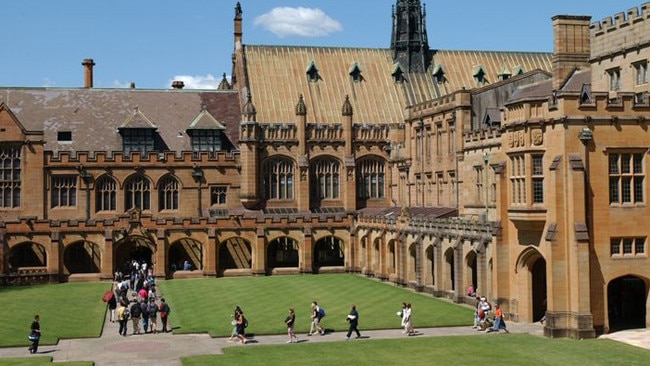
Ten leading universities face the loss of $1.2bn in fees from about 65,800 students who are at risk of cancelling their first semester courses because they are stranded in China due to the Morrison government’s coronavirus travel ban.
Exclusive analysis by The Australian of the Group of Eight universities — plus the University of Technology Sydney and RMIT — has revealed that more than 60 per cent of an estimated 109,000 Chinese students enrolled in first-semester courses are still in China.
The Australian National University — which has about 4000 of its estimated 5000 Chinese students stuck in China — is the first Australian university to offer free online courses for those unable to make it to campus by the end of March as it seeks to navigate the coronavirus crisis.
The figures capturing the potential impact of the virus outbreak on the higher education sector come as top universities and their federal regulators face claims of negligence for having developed an excessive dependence on Chinese students.
The Centre for Independent Studies, a free-market think tank, has conducted an analysis showing the fallout from the epidemic could wipe as much as $12bn from the nation’s export earnings.
The report’s author, Salvatore Babones, singled out the Tertiary Education Quality and Standards Agency for “massive failure” of oversight and warned it was “inherently risky” to build a business around education exports to citizens of “a totalitarian police state”.
The study concluded that more than 40 per cent of education exports to China — worth $12.1bn last year — could evaporate, even if the coronavirus epidemic is contained by June.
“The rapid sustained revenue growth of the last five years gave education service exporters ample opportunities to build reserves in preparation for a sudden downturn, even if they could not predict the precise form or timing of it,” the paper found.
At least 170 Australians on the disease-ridden Diamond Princess cruise ship quarantined off Yokohama, Japan, are expected to board a Qantas flight on Wednesday, after which they will be transferred for 14 days to Darwin’s Howard Springs facility.
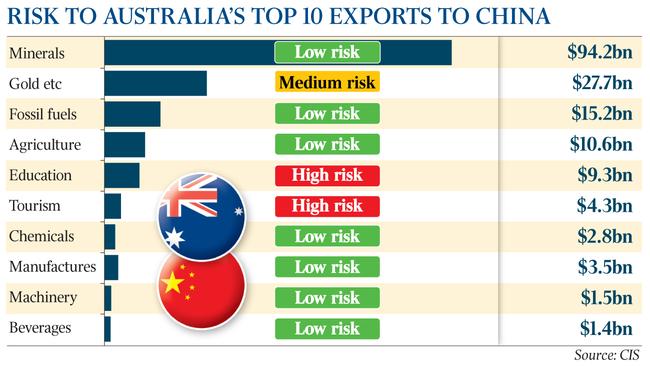
The number of infected Australians on the cruise ship rose on Tuesday, with government sources saying there were now 36 cases on board the vessel. Those Australians infected with the virus will be treated in Japanese hospitals instead of returning home, while about 20 more passengers were on Tuesday night preparing to refuse the government’s evacuation offer.
The virus outbreak, which emerged in Wuhan province in early January, has resulted in more than 1800 deaths and infected more than 73,000. In Australia, the number of infections is still 15.
Scott Morrison extended a China travel ban by one week last week, as the government assesses the economic damage of the virus. Experts warn the economy could contract in the March quarter.
ANU has estimated that about 700 international students scheduled to commence courses this semester will be eligible to receive free online courses delivered through a “hardship scholarship”.
Vice-chancellor Brian Schmidt said the concession showed the university was taking “a student-first approach” to the crisis.
“The No 1 goal is to keep as many of our students as possible engaged with their learning and our community,” Professor Schmidt said.
The hardship scholarship will cover normal tuition fees for some 650 subjects the university already has available online.
The ANU’s March 31 deadline is judged as “the absolute cut-off for students to be able to arrive on campus and take classes without experiencing academic hardship”.
Chinese enrolments at Australian universities have grown six-fold since 2002 to almost 277,000 as of last November, according to the findings of the CIS paper to be released on Wednesday.
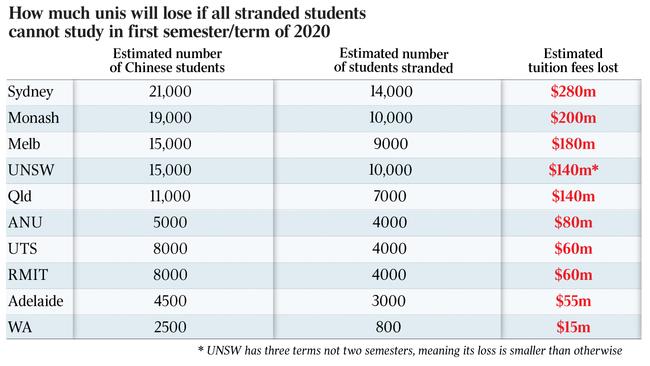
The analysis from Mr Babones found that Chinese students made up 29 per cent of all international enrolments, including 39 per cent of higher education enrolments. Twenty per cent or more of revenues at the Universities of NSW, Sydney and UTS comes from Chinese students. “The epidemic has hit at the worst possible time from the standpoint of university enrolments; students may miss an entire semester while many may never commence them at all,” Mr Babones said.
“Taxpayers are likely to be called on to rescue their universities from the most dire financial consequences of the coronavirus epidemic, and perhaps to rescue many private companies as well.”
Vicki Thomson, chief executive of Group of Eight, which represents the biggest research universities, said the sector’s top focus was on students and not the financial impact of the virus outbreak.
“I can’t see a request for bailouts on the horizon; we’re not at a stage yet where we’re shutting doors,” Ms Thomson said.
She rejected the idea universities were too exposed to China, arguing there was no “industry in this country that isn’t reliant on China as a major trading partner”.
Education Minister Dan Tehan played down the prospect of bailouts, saying universities were “incredibly well run”.
“They have very good university councils, and most of them have very, very good balance sheets,” Mr Tehan said.
The CIS analysis puts total loss of export revenue this year arising from the coronavirus at up to $12bn, or about 7 per cent of annual total exports to China, including $1.9bn in tourism, $3.8bn in education exports and $190m in passenger travel services.
Resources exports to China — worth $94bn last year — would be more resilient than services, the study found. “Australia’s miners are accustomed to managing risk and have well-developed tools for minimising its effects, such as forward contracts, commodities futures, and credit insurance. They also tend to hold substantial financial reserves,” Mr Babones said.
He warned government against bailing out education providers or private businesses such as Qantas, arguing they should look to private finance to make up any shortfall. “The public has no moral obligation to bail out these firms, which should have made appropriate provisions for such a crisis,” he said. “Notwithstanding their reckless behaviour … it is likely that universities and other education institutions will lobby the government to make good their losses on the argument the government gratuitously imposed a ban on travel from China.”


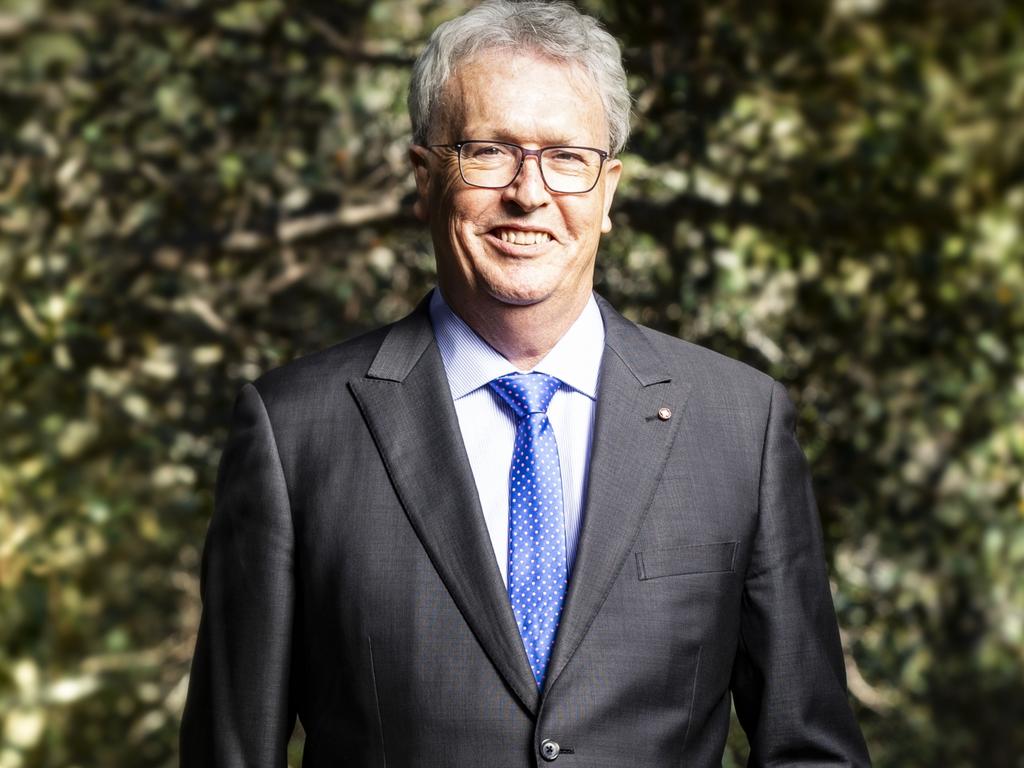

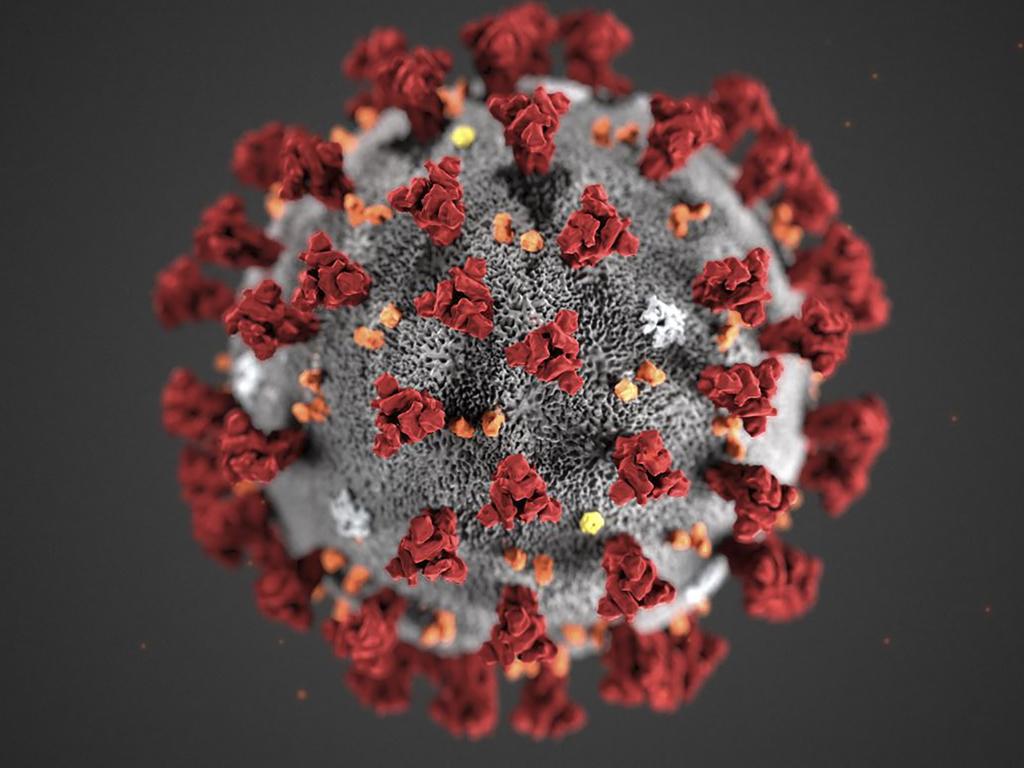


To join the conversation, please log in. Don't have an account? Register
Join the conversation, you are commenting as Logout